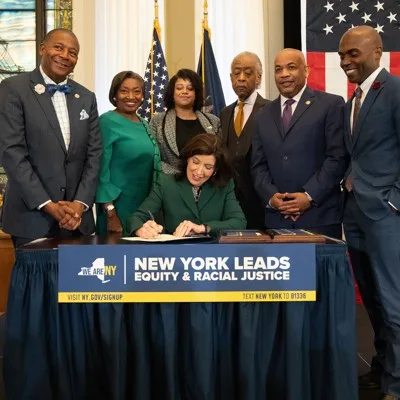
New York has officially formed the State’s Commission to Study Reparations And Racial Justice on Thursday, just a few months after Gov. Kathy Hochul signed the legislation that called for its creation. On Thursday, the governor, Senate Majority Leader Andrea Stewart-Cousins and Assembly Speaker Carl Heastie announced their picks for the nine-member panel, with each official picking three members. Once the commission convenes its first meeting, it will have one year to deliver its findings and recommendations to the Hochul and the state Legislature.
Hochul appointed Jennifer Jones Austin, the CEO and executive director of the Federation of Protestant Welfare Agencies; Timothy Hogues, the state Department of Civil Services Commissioner and president of the state Civil Service Commission; and Linda Brown-Robinson, the New York State NAACP Western Region Director.
Stewart-Cousins selected Darrick Hamilton, the director of the Institute on Race, Power and Political Economy at The New School; Linda Tarrant-Reid, executive director of the Lincoln Park Conservancy, which runs a food insecurity program in Westchester County; and Seanelle Hawkins, the president and CEO of the Urban League of Rochester.
Heastie chose Ron Daniels, the founder and president of the Institute of the Black World 21st Century; Lurie Daniel Favors, the executive director at the Center for Law and Social Justice at Medgar Evers College; and Deborah Jenkins, founding pastor of the Faith at Work Christian Church in Co-op City.
Debates in New York over the feasibility and need for reparations raged for years before the legislation creating the commission passed last June and was signed into law in December. Now that the commission’s work is speeding towards a start, some are already celebrating.
“The Reparations Commission is the first step towards forging a path that acknowledges America’s original sin and addresses centuries of discrimination, redlining, and institutionalized oppression. … I am incredibly proud as a Black man and a New Yorker that we are taking this step in the right direction to foster racial healing, and I look forward to continuing to fight for these policies at the federal level,” Rep. Jamaal Bowman said in a statement.
The two prime sponsors of the legislation that created the commission – Assembly Member Michaelle Solages and state Sen. James Sanders Jr. – hosted a community discussion about the commission on Feb. 17. While reflecting on the importance of reparations and the road it took to get there, some in the community bristled at the idea that financial payment recommendations were not a guaranteed provision of the commission. But Brooklyn NAACP President L. Joy Williams said that rather than argue, the Black community needed to come together and collect its ideas because the commission would be seeking their input soon.
Last year, Lisa Holder, a member of California’s reparations task force, told City & State that compensation, restitution, apologies or atonement and guarantees of non-repetition and rehabilitation should be components of reparations. New York lawmakers have similar hopes.
“This commission has a unique mission, and all appointees possess areas of expertise that will contribute to the overarching goal of restitution and rehabilitation – core tenets of reparations,” Solages said in a statement.

